De Engelse schrijver J.R.R. Tolkien werd geboren op 3 januari 1892 in Bloemfontein, Zuid-Afrika. Zie ook mijn blog van 3 januari 2007 en ook mijn blog van 3 januari 2008.
Uit: The Children of Hurin
„In the year that Turin was seventeen years old, his grief was renewed; for all tidings from his home ceased at that time. The power of Morgoth had grown yearly, and all Hithlum was now under his shadow. Doubtless he knew much of the doings of Hurin’s people and kin, and had not molested them for a while, so that his design might be fulfilled; but now in pursuit of this purpose he set a close watch on all the passes of the Shadowy Mountains, so that none might come out of Hithlum nor enter it, save at great peril, and the Orcs swarmed about the sources of Narog and Teiglin and the upper waters of Sirion. Thus there came a time when the messengers of Thingol did not return, and he would send no more. He was ever loath to let any stray beyond the guarded borders, and in nothing had he shown greater good will to Hurin and his kin than in sending his people on the dangerous roads to Morwen in Dor-lomin.
Now Turin grew heavy-hearted, not knowing what new evil was afoot, and fearing that an ill fate had befallen Morwen and Nienor; and for many days he sat silent, brooding on the downfall of the House of Hador and the Men of the North. Then he rose up and went to seek Thingol; and he found him sitting with Melian under Hirilorn, the great beech of Menegroth.
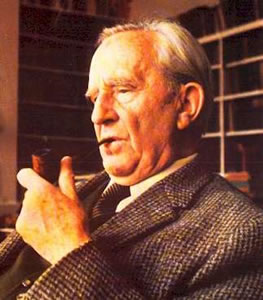
J.R.R. Tolkien (3 januari 1892 – 2 september 1973)
De Franse schrijfster Marie Darrieussecq werd geboren in Bayonne, Pyrénées-Atlantiques, op 3 januari 1969. Zij behaalde haar Baccalauréat aan het Lycée Cassin in Bayonne en studeerde vervolgens aan de Ecole Normale Supérieure in Parijs Franse literauur. Zij vervolgde de studie aan de Sorbonne Nouvelle en aan de Jussieu. In 1997 studeerde zij af. In 1996 debuteerde zij met de roman Truismes. Ze debuteerde in 1996 met de roman Truismes, over een vrouw die in een varken verandert in een toekomstige, dictatoriale maatschappij. De roman kende een enorm succes in Frankrijk en werd in een groot aantal landen in vertaling uitgebracht. Sindsdien geldt Darrieussecq als een van de origineelste jonge Franse auteurs. Na ditsucces besloot Darrieussecq geen docente te blijven, maar door te gaan met schrijven. Haar tweede roman, Naissance des fantômes (1998, in vertaling Spookverschijningen) is net als Tom is dood een verslag van een vrouw die zich geconfronteerd ziet met een ingrijpende gebeurtenis, in dit geval het feit dat haar man niet meer terugkeert van een boodschap die hij ging doen.
Werk o.a.: La Plage, 2000, Bref séjour chez les vivants, 2001, White, 2003, Le Pays, 2005, Tristes Pontiques, 2008
Uit: Tom est mort
“Je n’avais jamais la sensation de dormir. Le matin j’étais plus fatiguée que la veille. Parfois l’interrupteur pour éteindre mon cerveau fonctionnait : les somnifères, des somnifères de cheval. Mais quand ça ne fonctionnait pas, quand je ne m’abattais pas comme une jument dans un sommeil de brute, j’avais le temps de visiter les coins les plus reculés du labyrinthe. Cauchemar, nuit, jour, quel nom portait ce lieu ? Tom avait brûlé. Corps et biens comme on dit, ses biens se montant à des sous-vêtements blancs, et à tout, tout. J’étais avec Tom. J’étais seule. Une écurie en flammes. Un caveau. Un caveau-écurie-soute-labyrinthe, nulle part, des couloirs infinis, des impasses, des oubliettes. Non, quel joli mot bénin que le mot oubliettes. J’étais dans le noir et la cendre du souvenir total. Gouffre au-dessus de moi, sans lumière. Plus de pensée. La douleur au point fixe. J’étais dans la vérité de la mort. Dans la lucidité extrême de l’insomnie.
Un simple récit, phrase après phrase sur un cahier pour raconter la mort de Tom, quatre ans et demi, à Sydney en Australie.
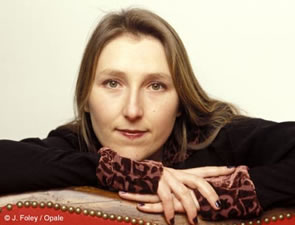
Marie Darrieussecq (Bayonne, 3 januari 1969)
De Estlandse dichter en schrijver Sven Kivisildnik (eig. Sven Sild) werd geboren op 3 januari 1964 in Rakvere. Hij behoorde tot de schrijversgroep Hirohall en is ook zanger van de groep Whaw! Zaiks. Hij is een scherp obsevator en criticus van de hedendaagse Estlandse samenleving. Hij debuteerde in 1987 met (Eng.) Wet Viktor, gebaseerd op een gedicht van Marie Under. In 1996 verscheen een volumineuze bundel van 800 pagina’s Like Red Agaric to a Bull (Nagu härjale punane kärbseseen), waarin het meeste werk tot dan toe was opgenomen. In 1997 verscheen het lange autobiografische gedicht A Human Being Tested on Animals (Loomade peal katsetatud inimene, 1997).
The Kalevipoeg Club
The Traks Grill stands behind the Luua Manor
near the Kalevipoeg Club.
It came to a man in a dream
that as the moon waned
on the first Thursday night
he should go to the Traks Grill
straight up to the bar
which still stands there today.
He should dig on the south side
under the bar near the cash register
until he comes across a sewage pipe,
then roll the pipe aside
to reveal a kettle filled with coins,
and if he doesn’t fear
what he will see there,
if he maintains his composure,
the wealth will be his.
It is said that the man went and dug
until he came to the pipes,
he rolled them aside,
and there he saw the kettle of coins.
As he began to hoist it from the pit
glamorous television hosts
swept up from underneath
in a cloud of dust and shards
all hissing horribly,
meaning to attack.
He flailed at them,
many fell dead
but more flew to replace them.
Fear overcame the man,
his body was wracked by tremors.
Finally he lept from the pit,
but on the edge stood
a large black Eurovision singer
snarling fearfully
and gnashing his teeth,
meaning to attack.
The man struck the singer
on the head with his spade
and ran all the way home
as fast as he could.
As for the coins, they were left
behind and remain there to this day,
but they can only be taken one day a year
on the Day of the Holocaust.
Vertaald door Hasso Krull en Brandon Lussier
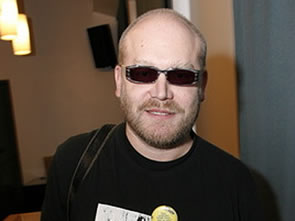
Sven Kivisildnik (Rakvere,3 januari 1964)
De Britse schrijver Alex Wheatle werd geboren op 3 januari 1963 in Londen als zoon van Jamaïcaanse ouders. Zijn jeugd bracht hij grotendeels door in een kindertehuis in Surrey. Vanaf zijn zestiende schreef hij songteksten over wat hij zag en meemaakte van het leven in Brixton. Deze werden later omgewerkt tot complete boeken. In 1999 debuteerde hij met Brixton Rock. Voor “East of Acre Lane” uit 2001 ontving hij de London Arts Board New Writers Award.
Uit: Authorised to intimidate (The Guardian, 21 februari 2008)
“I find it difficult to be so optimistic. I can’t forget what happened in Brixton when I was growing up. In 1980 I was 17, unemployed, and living in a social services hostel. One February night we held a rave, and at 2am a dozen police officers arrived at the front door and asked us to turn the music down. We did as we were told but the officers did not disperse – probably a reaction to the exotic aroma wafting from the windows. Ravers held the door against the police. Sirens sounded, vans screeched and we heard the stomp of police boots before they battered the door down. What followed was reckless, wanton and without mercy. Young women as well as men were truncheon-whipped, kicked, punched and spat upon. I was one of many hurled into the back of police vans like diseased cattle. Many of us were bleeding; one friend was left with a broken arm. Most of us were 18 or under.
At the police station we were placed in cells, where we heard shrieks and screams as the brutality continued. I’m not sure if the beating I suffered or the waiting was worse. When a doctor finally arrived, he was told by the police that the injuries were sustained by criminals resisting arrest. In 1980s Brixton, no figure of authority believed what a black youth said. Yes, minor crime had occurred at the hostel, but the reaction was grossly disproportionate.
Up to the Brixton uprising in April 1981, I was stopped under the “sus” law by the police every time they saw me, sometimes twice a day. I was once arrested for looking into a jewellery shop window. Friends were beaten up by the Met’s special patrol group squads on a regular basis. To be out on the street meant chancing your freedom. The tension ratcheted up. Everyone felt that something was about to happen, but when it did that warm spring day, I don’t think anyone expected the blood, fury and sheer hatred that was unleashed. Mainland Britain hadn’t seen anything like it in 100 years. My lasting memory of the three days of rioting was seeing a melting policeman’s helmet. It’s incredible no one was killed.”
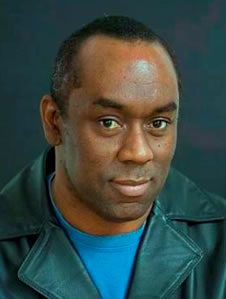
Alex Wheatle (Londen, 3 januari 1963)
De Romeinse schrijver, redenaar, politicus, advocaat en filosoof Marcus Tullius Cicero werd geboren in Arpinum op 3 januari 106 v. Chr. Zie ook mijn blog van 3 januari 2007 en ook mijn blog van 3 januari 2008.
Uit: De Goden (De Natura Deorum)
„In de buurt staat de Centaur:
zijn paarde-delen wil hij wagen aan de Scharen.
Terwijl zijn rechterhand ‘t viervoetig Beest vastgrijpt,
beweegt hij grimmig voorwaarts naar het prachtig Altaar.
Daar werkt ook Hydra zich vanuit de diepten op,
wier lichaam zich lang uitstrekt
en bij haar middenkrul licht glanzend ‘t Mengvat op,
terwijl haar uiteind door de dicht bepluimde Raaf
behapt wordt; in de buurt daar, in het zicht van Tweeling,
zit “Voor-hond”, die in ‘t Grieks Prokúôn is geheten.
Heel dit sterrensysteem, heel deze grote hemeldecoratie: kan iemand die
bij zijn verstand is, denken dat dit het produkt is van toevallige, lukraak her en der
snellende partikels? Of zou misschien een soort van ander wezen zonder intelligentie en rede het hebben kunnen produceren? Maar het maken ervan vergde toch duidelijk rede, en sterker nog: men kan hun natuur niet eens begrijpen zonder de hoogste vorm van rede.
Dit alles is al bewonderenswaardig, maar hierbij blijft het niet: er is niets zo
opvallend als het feit dat de wereld een zodanige stabiliteit en samenhang vertoont,
dat er niets bestaat of zelfs maar denkbaar is dat beter is toegerust voor een lang
voortbestaan. Want alle delen van de wereld streven gelijkmatig van alle kanten naar het midden. Aaneengevoegde voorwerpen blijven het beste aan elkaar vast zitten wanneer ze met een soort keten helemaal aaneengebonden worden; in de wereld wordt deze rol vervuld door de natuur: zij zit overal in en brengt alles met geest en rede tot stand, ze trekt de buitenste delen naar het midden en balt ze samen.“
Vertaald door Vincent Hunink

Cicero (3 januari 106 v. Chr. – 7 december 43 v. Chr.)
De Franse schrijver en essayist Pierre Eugène Drieu la Rochelle werd geboren op 3 januari 1893 in Parijs. Hij kwam uit een katholiek, conservatief maar gebroken gezin. Reeds van in z’n kindertijd was hij een groot lezer en dromer over de Napoleontische grandeur, militair heldendom en koloniaal avontuur die fel contrasteerde met het decadente bourgeois-leventje van zijn familie. Op zijn vijftiende trok hij naar Engeland, hij zou er een levenslange liefde aan over houden voor al wat Engels is. Drieu studeerde in Parijs aan de ‘École libre sciences politiques’. Hij werd er sterk beïnvloed door het lezen van werken van Kipling, Barrès en vooral Nietzsche. Op zeventienjarige leeftijd raakte hij onder indruk van reactionaire gedachten, de Action Française, en las Maurras, Bainville, Sorel, Proudhon,… In 1914 werd hij gemobiliseerd en ingezet in de gevechten in Charleroi en Verdun. Hij raakte twee maal gewond en gehospitaliseerd, zijn oorlogservaring tekende hem. In zijn romans schetste Drieu la Rochelle een gedegenereerde bourgeoisie die elke wil ontbreekt, het beeld van zijn eigen familie was nooit ver weg. De Tweede Wereldoorlog en de Duitse hegemonie zijn voor Drieu een kans om een nieuw Europa op te bouwen. Drieu la Rochelle wees uitdrukkelijk de liberaal-democratie af als zijnde een materialistische decadentie maar hij bekritiseerde ook het nationaal-socialisme. Hij was één van de bekendste “non-conformisten” uit het Frankrijk van de jaren ’30. Korte tijd behoorde Drieu tot de Parti Populaire Français van de ex-communist Doriot. De Nieuwe Ordening die Drieu voorstond, was uitdrukkelijk sociaal en aristocratisch getint (le Jeune Européen, 1927), en hij dan ook gewillig deel uit van de collaboratie na de Duitse verovering van Frankrijk (Notes pour comprendre le siècle, 1941). Maar na enkele jaren raakte hij ontgoocheld in de pétainistische politiek en de houding van de Duitse overheid in Frankrijk. Aan het einde van de oorlog weigerde Drieu, ondanks bescherming vanwege tr
ouwe vrienden zoals Malreaux, om te vluchten of zich te verstoppen voor de geallieerden die hij “les ennemis de l’Europe” noemt. In de laatste maanden van zijn leven betoondehij een zeker respect voor het communisme van Stalin. Op 16 maart 1945 pleegde hij zelfmoord in Parijs.
Uit: Le Jeune Européen
“Je suis désespéré, moi l’Européen, j’aime encore tout ce qui fut et qui s’en va. J’aime mes mains libres et les outils si fins et si forts qu’elles pouvaient saisir et reposer. O beaux gestes, nets et fermes, garantie d’un intellect victorieux ; autour du geste de l’art, le geste de la guerre et le geste de l’amour. Tuer son ennemi et prendre une femme, tuer celui qu’on méprise et enfermer celle qu’on craint. Les gestes qui créaient, les gestes qui tour à tour déchaînaient et réenchainaient le mouvement. Comment affirmer, créer, si l’on n’est pas capable à l’extrême limite de son désir et de son vouloir, de tuer et d’être tué ? Tuer ou se faire tuer, c’est la même chose, c’est manifester également qu’on croit à l’identité humaine. C’est le cri certain. Et pourtant, qui, aujourd’hui, peut tuer sans effort ? Une brute, ou un vicieux, ou un gamin drogué de mets. Moi, en dépit de mes campagnes, de tout ce sang en Champagne et en Ukraine, je pâlis devant le sang. Alors le cri certain tourne à n’être qu’une fanfaronnade malsaine, digne d’un sectaire de ruisseau, fasciste ou communiste.
Et ce geste de la prière à la fin qui remettait tout en place, qui anéantissait tout. L’homme des rébellions à main armée, l’homme des exactions hardies, l’homme des désirs et des assouvissements, l’homme qui avait un caractère et dont on peignait le portrait, il savait reconnaître les saisons, et un beau soir, il se rendait à Dieu. Alors c’était un dernier combat, une dernière étreinte, un dernier dialogue, d’où sortait une nouvelle et suprême forme de l’être.
Tout cela s’embrouille et m’échappe. Et pourtant je suis encore debout et je proteste.
Après tout, je ne suis pas qu’un écrivain, je suis un homme en proie au problème total.
Toute cette écriture, toute cette tunique de signes qui s’accroche à mes reins, c’est votre tourment à tous, c’est votre vieille conscience fatiguée, exsangue.
Il me semble pourtant que je suis encore vif, que je la déchire, que je l’arrache, qu’elle tombe.
Je brise la poésie même ou ce qui en reste.
En dépit de la mitrailleuse de Lénine ou de Mussolini, je ne veux pas rentrer dans votre usine américaine, même pas comme homme de rebut, comme poète. Plus de métiers, puisque ce sont vos métiers.“

Pierre Drieu la Rochelle (3 januari 1893 – 16 maart 1945)
De Duitstalige dichter en schrijver Wolf von Aichelburg werd geboren in Pula, Transsylvanië, (destijds Oostenrijke-Hongarije, tegenwoordig Kroatië) op 3 januari 1912. In 1918 vestigde zijn familie zich in Hermannstadt. Van 1928 tot 1934 studeede hij in Klausenburg en Dijon germanistiek en romanistiek. Na een aantal reizen door West-Europa keerde hij in 1939 naar zijn geboortegrond terug. Na WO II werd hij door het communistische regime vervolgd en tot 25 jaar veroordeeld. In 1964 kwam hij door een algemene amnestie vrij. In 1980 verliet hij Roemenië en vestigde hij zich in Freiburg im Breisgau.
SAVONAROLA
Der Gier der Flamme war ich zugeschworen
Durch einen grausamen Geheimvertrag,
War ihre Beute, eh ich noch geboren.
Sie lauerte als Funken auf den Tag,
Wo mich des Schicksals blinde Knechte banden
Und sie befreiten aus der Kerkerhaft.
Sie wird nun jede Schranke überbranden
In allzulang gestauter Leidenschaft.
Käm fernher jagend jetzt ein Gnadenruf
Und stürzte Regen, bräche das Gedräng
Der Menge ein, der Pferde wilder Huf,
Die Flamme läßt nicht mehr. Sie hält mich eng.
Dein Wort war Feuer. Du hast mich gerufen,
Dein Haß und deine Liebe waren Glut!
Nun klimme, spricht sie, diese Bretterstufen,
Bis du gestillt ertrinkst in meiner Flut.

Wolf von Aichelburg (3 januari 1912 – 24 augustus 1994)
Het amfitheater in Pula (geen portret beschikbaar)
De Australische schrijfster Henry Handel Richardson (eig. Ethel Florence) werd geboren op 3 januari 1870 in Melbourne. In der jaren 1890 reisde zij met haar moeder en zuster naar Leipzig, waar zij piano studeerde en haar latere man ontmoette, en ervaringen opdeed die zij in haar debuutroman Maurice Guest verwerkte. Tot aan diens vroege dood leefde zij met haar man in Londen, daarna met een jongere vriendin in Fairlight bij Hastings (Sussex). Het bekendste werk van haar is de trilogie Australia Felix, dat beschouwd wordt als een van de belangrijkste werken uit de Australische literatuur.
Uit: Henry Handel Richardson, A Life (door Michael Ackland)
“Biography inevitably assumes a particular angle of vision, and this account of her life is no exception. It is haunted by two images. One is of the impressionable child in ‘The Bathe’, the tale which introduces her last major work, Growing Pains: Sketches of Girlhood. This story focuses on a crisis of self-identity, and a dawning, fearful realisation of the burden of gender which the female child is destined to assume. It opens with a naked prepubescent girl, frolicking in the shallows beyond the restricting shoreline. Observing her from the beach are two mature women. Enticed by her heedless pleasure as well as by the inviting natural scene, they decide to strip and join her. Layer upon layer of clothes is cast off to reveal tired, blotched, misshapen bodies marked by the trials of sexual maturity:
“Splay-legged they were, from the weight of these [physical] protuberances. Above their knees, garters had cut fierce red lines in the skin; their bodies were criss-crossed with red furrows, from the variety of strings and bones that had lashed them in. The calves of one showed purple-knotted with veins; across the other’s abdomen ran a deep, longitudinal scar. One was patched with red hair, one with black.”
For the child it is a terrifying revelation. Before this, she has no more seen a naked female body than grasped what adulthood might mean for her. Now she stares with ‘horrid fascination’ at ‘something ugly’—socially and biologically inscribed females. Her concluding thoughts are at once comprehensible and mockingly impossible: ‘Oh, never … never … no, not ever now did she want to grow up. She would always stop a little girl’.

Henry Handel Richardson (3 januari 1870 – 20 maart 1946)
De Franse schrijver Charles Palissot de Montenoy werd geboren in Nancy op 3 januari 1730. Zijn eerste werk werd in 1755 gepubliceerd. Hij was vanaf 1798 lid van de ‘conseil des anciens’ van het departement Seine-et-Oise en conservator van de bibliothèque Mazarine. Hij was een hevig tegenstander van de verlichte philosophes, vooral van Diderot. Het meeste bekendheid verwierf hij met zijn komedie Les Philosophes, die een enorm schandaalsucces was in 1760.
Uit: Les Philosophes
Marton.
Toute femme est, monsieur, un animal changeant.
On pourrait calculer les jours de Cydalise
par les différents goûts dont son ame est éprise :
quelquefois étourdie, enjouée à l’ excès,
d’ autres fois sérieuse, et boudant par accès ;
coquette, s’ il en fut, en sauvant le scandale,
prude à nous étourdir de son aigre morale ;
courant le bal la nuit, et le jour les sermons ;
tantôt les directeurs, et tantôt les bouffons.
C’ était-là le bon tems. Mais aujourd’ hui que l’ age
fait place à d’ autres moeurs, et veut un ton plus sage,
madame a depuis peu réformé sa maison.
Nous n’ extravaguons plus qu’ à force de raison.
D’ abord on a banni cette gaité grossiere,
délices des traitans, aliment du vulgaire ;
à nos soupés décens tout au plus on sourit.
Si l’ on s’ ennuie, au moins c’ est avec de l’ esprit.
Quelquefois on admet, au lieu de Vaudevilles,
de savans concerto, de grands airs difficiles ;
car il faut bien encore un peu d’ amusement.
Mais notre fort, monsieur, c’ est le raisonnement.
Quelque tems, dans le cercle, on parla politique ;
enfin tout disparut sous la métaphysique.
Damis.
Quelque chargé que soit ce bizarre tableau,
je livre Cydalise aux traits de ton pinceau ;
je m’ en rapporte à toi. Mais que fait Rosalie ?

Charles Palissot de Montenoy (3 januari 1730 – 15 juni 1814)
De Engelse schrijver Douglas William Jerrold werd geboren op 3 januari 1803 in Londen. In 1821 kwam een toneelstuk van hem op de planken van het Sadler’s Wells theatre, dat hij al als veertienjarige geschreven had. Andere stukken volgden en in 1825 kreeg hij een vaste aanstelling als schrijver bij het Coburg theatre. Hij bleef komedies schrijven, maar leverde later ook bijdragen aan tijdschriften als Monthly Magazine, Blackwood’s, New Monthly, Athenaeum en Punch. Tot zijn succesvolste werken behoren Mrs Caudle’s Curtain Lectures, Black-eyed Susan, Men of Character en A Man made of Money.
Uit: MRS. CAUDLE’S CURTAIN LECTURES
“You ought to be very rich, Mr. Caudle. I wonder who’d lend you five pounds? But so it is: a wife may work and may slave! Ha, dear! the many things that might have been done with five pounds. As if people picked up money in the street! But you always were a fool, Mr. Caudle! I’ve wanted a black satin gown these three years, and that five pounds would have entirely bought it. But it’s no matter how I go, – not at all. Everybody says I don’t dress as becomes your wife – and I don’t; but what’s that to you, Mr. Caudle? Nothing. Oh, no! you can have fine feelings for everybody but those belonging to you. I wish people knew you, as I do – that’s all. You like to be called liberal – and your poor family pays for it.
“All the girls want bonnets, and where they’re to come from I can’t tell. Half five pounds would have bought ’em – but now they must go without. Of course, they belong to you: and anybody but your own flesh and body, Mr. Caudle!
“The man called for the water-rate to-day; but I should like to know how people are to pay taxes, who throw away five pounds to every fellow that asks them?
“Perhaps you don’t know that Jack, this morning, knocked his shuttlecock through his bedroom window. I was going to send for the glazier to mend it; but after you lent that five pounds I was sure we couldn’t afford it. Oh, no! the window must go as it is; and pretty weather for a dear child to sleep with a broken window. He’s got a cold already on his lungs, and I shouldn’t at all wonder if that broken window settled him. If the dear boy dies, his death will be upon his father’s head; for I’m sure we can’t now pay to mend windows. We might though, and do a good many more things too, if people didn’t throw away their five pounds.
“Next Tuesday the fire-insurance is due. I should like to know how it’s to be paid? Why, it can’t be paid at all! That five pounds would have more
than done it – and now, insurance is out of the question. And there never were so many fires as there are now. I shall never close my eyes all night, – but what’s that to you, so people can call you liberal, Mr. Caudle?”

Douglas Jerrold (3 januari 1803 – 8 juni 1857)
De Duitse schrijver en jurist Hermann von Weinsberg werd geboren op 3 januari 1518 in Keulen. Hij is bekend geworden door het „boich Weinsberg“, het eerste autobiografische document in de Duitse taal. Hij studeerde in Keulen en Emmerich. In 1837 behaalde hij de titel Magister artium en hij kwalificeerde zich in 1543 als jurist. Hij werkte als jurist, beheerde het geld van zijn welgestelde vrouwen, bezat een herberg en een wijnhandel.
Uit: Boich Weinsberg
“Wa etwas under allen vergenklichen dingen daurhaftich ist, lieber hausfatter, so ist die geschrift nach viller trefflicher leut zeugnis das allerlankwirigst und zu ewicher zit daurhaftigst wirk. Dan was von dem menschen immer geredt, gehort, geschein, gedain und gelaissen wirt, das verstirbt auch gemeinlich mit dem menschen, oder verpleibt es schoin ein zit lank durch verzellung und nachsagen, so verfelt es doch gern balde ader es wirt nit eigentlich ader recht behalten, dan der menschen gedechtnis ist swach und vergeslich. Derhalb hat got der her die wonderschone schreibkunst gegeben, das dadurch der swacheit und vergeslichheit menschlicher memorien und gedechtnis verholfen mogt werden, wilche alle beschene dingen in einer unsterblicheit erhelt und was vergessen und verstorben ist, widderumb erneuwert, hervurbringt und lebentich macht.”
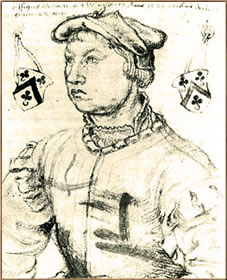
Hermann von Weinsberg (3 januari 1518 – 23 maart 1597)
1540, 22 jaar oud, kunstenaar onbekend
Zie voor onderstaande schrijver mijn blog van 3 januari 2008.
De Duitse dichter en schrijver Johann Jacob Balde S.J. werd geboren op 3 januari 1604 in Ensisheim in de Elzas.
